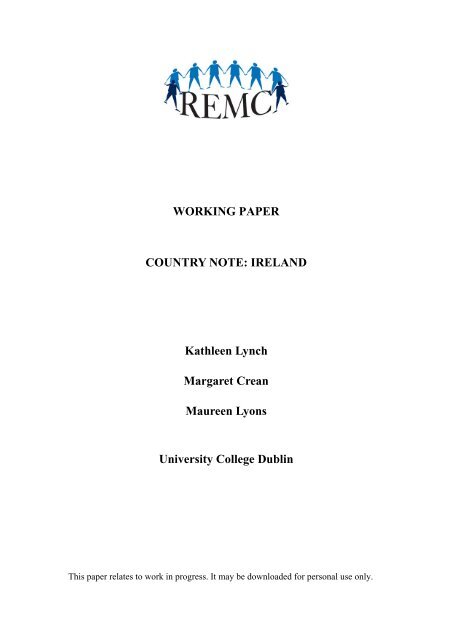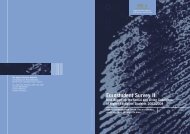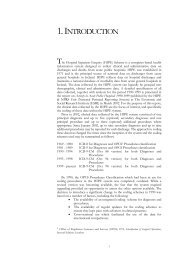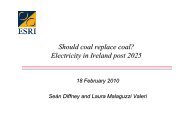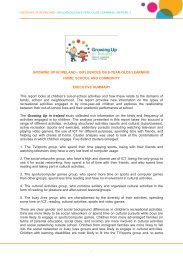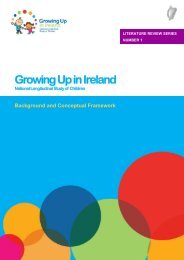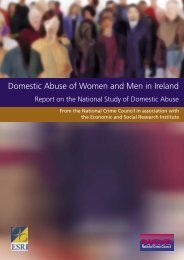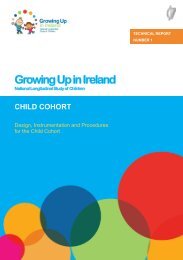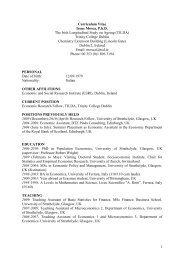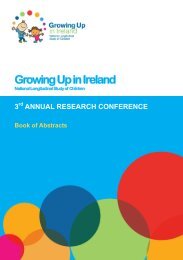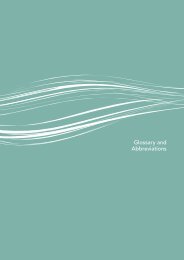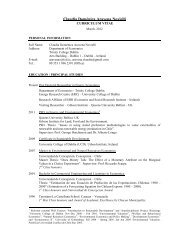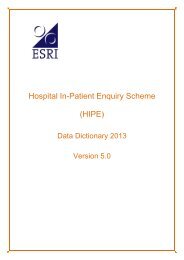Working paper country note: ireland kathleen lynch - ESRI
Working paper country note: ireland kathleen lynch - ESRI
Working paper country note: ireland kathleen lynch - ESRI
Create successful ePaper yourself
Turn your PDF publications into a flip-book with our unique Google optimized e-Paper software.
WORKING PAPER<br />
COUNTRY NOTE: IRELAND<br />
Kathleen Lynch<br />
Margaret Crean<br />
Maureen Lyons<br />
University College Dublin<br />
This <strong>paper</strong> relates to work in progress. It may be downloaded for personal use only.
Contents<br />
1. Historical overview and introduction to the primary (national) school system........... 2<br />
2. Ownership and control of the primary (national) school system............................... 14<br />
3. Description of the primary (national) school system................................................. 21<br />
4. Conclusion ................................................................................................................. 23<br />
References...................................................................................................................... 24<br />
1
1. Historical overview and introduction to the primary (national)<br />
school system<br />
1.1. Historical background<br />
There is no state or local authority-owned primary school system in Ireland 1 , despite<br />
the use of the term national to describe the primary school system. All primary<br />
schools are publicly funded 2 but privately owned (the majority by religious<br />
organisations) and under private (mostly religious) management (Hyland, 1996). The<br />
majority of primary schools are owned and managed by the Roman Catholic Church<br />
(92%) 3 . The denominational characteristic of the Irish primary school system can be<br />
traced to the early eighteenth century. In 1831 the British administration in Ireland<br />
established a state supported primary school system, under the control of a State<br />
Board of Commissioners. This was a significant attempt by the state to unite children<br />
of different denominations 4 .<br />
The British administration intended the national system to be multidenominational<br />
or mixed with local patronage/ management, and state aid was to be<br />
prioritised for schools comprising mixed denominational groups. The requirement that<br />
a proportion of both current and capital costs had to be provided from local sources<br />
meant that the churches were uniquely placed financially to avail of the state-aided<br />
system. However, church opposition to a state system of multi-denominational<br />
schooling, meant that very few schools established were actually jointly managed<br />
(Coolahan, 1981; CPSMA, 2004). The main Christian Churches negotiated with the<br />
government to modify the system and provide aid to schools under the management of<br />
individual churches (Akenson. 1970; Hyland, 1989; Coolahan, 1981). During the<br />
years of British administration, the rules for national (primary) schools upheld the<br />
principle that state aid would only be provided for schools which were open to<br />
1 In the nineteenth century nine Model Schools were established, which are State owned and under the patronage of the Minister. These<br />
were originally conducted on a mixed or multi-denominational basis. No model schools have been established since.<br />
2 The exemption being fee-paying schools at primary school level, which are attended by a very small proportion of the student<br />
population (approximately 1% of primary schools are fee-paying).<br />
3 Statistics refer to 2006/2007 list of primary schools accessed from the Department of Education and Science Education Provider<br />
Search facility at http://www.education.ie/home/home.jsp?pcategory=10917&ecategory=12016&language=EN<br />
4 This is also argued to have been advanced by the British administration as a way of anglicising Ireland as English was the medium of<br />
instruction in the national schools (Coolahan, 1981).<br />
2
children of all religious persuasions and which operated under these principles<br />
(Hyland, 1996). In practice, however, each of the different denominations strove to<br />
shape the national system in the interests of its denominational requirements<br />
(Coolahan, 1981). In effect, throughout the nineteenth century, contrary to the<br />
underlying principle of providing a mixed school system, the state-aided school<br />
system developed into a state-aided denominational school system. The Irish State<br />
gained independence in 1921 and by that stage virtually all national schools were<br />
under the patronage and management of either Roman Catholic or Protestant<br />
churches. After independence, little change took place in the administration and<br />
financing of the national school system, despite control of the system being<br />
centralised within a Department of Education. The Irish constitution of 1937<br />
consolidated the denominational nature of the primary level system (Hyland, 1996). It<br />
was not until 1975 that the first multi-denominational school was set up in Ireland<br />
(Hyland, 1989; 1996).<br />
1.2. Legislative context<br />
Under Article 42 of the 1937 Constitution the Irish State is obliged to give reasonable<br />
aid to private and corporate educational initiatives. This has allowed for the continued<br />
State support of religious run schools. Also, according to Article 42, the family is<br />
defined as ‘the primary and natural educator of the child’ (Article 42.1) and it is the<br />
parent’s right to provide for the religious education or his children. Article 42 goes on<br />
to state that parents shall be free to provide this education in their homes or in private<br />
schools or in schools recognised or established by the State. The responsibilities of the<br />
State are relatively limited (Hyland, 1996). A number of judicial rulings have<br />
interpreted Article 42 as offering implied protection for the denominational nature of<br />
schooling (Lodge and Lynch, 2004). Article 44 upholds the free practice of religion.<br />
Article 44 also refers to state aid to religious institutions and holds that the State can<br />
not discriminate between the different denominations, and that children have a right to<br />
attend state-aided schools without religious instruction.<br />
All schools operate according to the Rules for National Schools which were<br />
drawn up by the Minister for Education (1965) 5 . It is argued that the state<br />
consolidated support for denominational schools in the preface to the revised Rules<br />
5 Full text accessed via http://www.education.ie/servlet/blobservlet/rules_for_national_schools_1_7.pdf<br />
3
for National Schools in 1965, which stated that ‘in pursuance of the provisions of<br />
these Articles [Articles 42 and 44.2.4°] the State provides for free primary education<br />
for children and gives explicit recognition to the denominational character of these<br />
schools’ (Hyland, 1989; Drudy and Lynch, 1993). Until the late 1990’s there was no<br />
substantive legislation underpinning the national school system (Constitutional<br />
Review Group, 1996: 317). The main pieces of legislation governing schools are the<br />
Education Act (1998) 6 and the Education (Welfare) Act (2000) 7 . The 1998 Act places<br />
a statutory duty on the Minister to ensure that appropriate education and support<br />
services are available to everyone, including every person with a disability or other<br />
special educational needs. It also states that schools must use their resources to ensure<br />
that the educational needs of all students, including those with a disability or other<br />
special educational needs, are identified and provided for. Schools are expected to<br />
have respect and promote respect for the “diversity of values, beliefs, traditions,<br />
languages and ways of life in society” (1998 (15) 2e). The 1998 Education Act<br />
recognises the autonomy of each school, under the patron, and sets out the main<br />
responsibilities and rights of the patron, the board of management, and the principal,<br />
subject to regulations made by the Minister. The Act also establishes the functions of<br />
boards of management in primary schools on a statutory basis. Functions of the Board<br />
of Management include determining the moral and religious education of pupils. The<br />
Act states that a school management board is required to uphold the “characteristic<br />
spirit” of the school as determined by its “cultural, educational, moral, religious,<br />
social, linguistic and spiritual values and traditions” (1998 (15) 2b). Consultation for<br />
the drafting of the Education Act 1998 also involved agreement on other legal<br />
provisions on the governance of primary schools. The Deed of Variation, one such<br />
legal provision, provides for the establishment of representative boards of<br />
management in primary schools (CPSMA, 2004). All Catholic Primary schools<br />
established before 1997 were subject to a lease signed when the school was set up.<br />
This lease included an undertaking that the school would be managed in accordance<br />
with the rules for National Schools. In 1997, the Patrons and the Minister for<br />
Education agreed (following discussions with the education ‘partners’) to vary the<br />
terms of the existing leases (CPSMA, 2004). The new document (Deed of Variation),<br />
6 Full text available via http://www.irishstatutebook.ie/1998/en/act/pub/0051/index.html<br />
7 Full text available via http://www.irishstatutebook.ie/2000/en/act/pub/0022/index.html<br />
4
which supplements the original lease, provides that the school will be managed in<br />
accordance with the rules laid down by the Minister for Education and in accordance<br />
with the ethos of a school, including religious ethos (CPSMA 2004; Department of<br />
Education and Science, 2007). According to their deed of variation, the board of<br />
management of a denominational primary school has an obligation to uphold and<br />
foster the school’s ethos (CPSMA 2004).<br />
Other legislation relevant to religion and schooling in Ireland includes the<br />
Employment Equality Act 1998 and the Equal Status Acts 2000 and 2004, which<br />
prohibit discrimination on nine grounds including religion (Lodge and Lynch, 2004).<br />
All Equality Acts apply to schools, which are, in turn, bound by a series of regulations<br />
relating to entry and enrolments that did not exist in the past. However, the equality<br />
legislation does contain exemptions in relation to maintaining the religious ethos of<br />
certain bodies. Section 7(c) of the Equal Status Act allows exemptions to<br />
denominational schools where the objective is to provide education in an environment<br />
that promotes certain religious values. A school that has this objective can admit a<br />
student of a particular religious denomination in preference to other students. Such a<br />
school can also refuse to admit a student who is not of that religion, provided it can<br />
prove that this refusal is essential to maintain the ethos of the school (The Equality<br />
Authority, 2005). The exemption with respect to the Employment Equality Act<br />
(Sections 12 and 37) means that a religious institution, such as a denominational<br />
school or denominational teaching training college, with the aim of providing services<br />
in an environment which promotes certain religious values shall not be taken to<br />
discriminate against a person if it gives more favorable treatment, on the religion<br />
ground, to an employee or a prospective employee over that person where it is<br />
reasonable to do so in order to maintain the religious ethos of the institution. In 2005,<br />
the UN Committee on the Elimination of Racial Discrimination (CERD) expressed<br />
concern that existing laws and practice favoured Roman Catholic pupils in the<br />
admission to Roman Catholic schools in case of shortage of places, particularly in the<br />
light of the limited alternatives available. It encouraged Ireland to promote the<br />
establishment of non-denominational or multi-denominational schools and to amend<br />
the existing legislative framework so that no discrimination may take place as far as<br />
the admission of pupils (of all religions) to schools is concerned (Kilkelly, 2007). The<br />
Committee on the Rights of the Child reiterated this recommendation in 2006<br />
(Kilkelly, 2007).<br />
5
Ireland signed the Convention on the Rights of the Child (UNCRC) on 30<br />
September 1990, and ratified it, without reservation, on 21 September 1992. The<br />
Convention entered into force in Ireland on 21 October 1992. With ratification,<br />
Ireland has undertaken to respect the Convention as international law and to<br />
implement its provisions. Article 30 of the Convention on the Rights of the Child<br />
declares the ‘right to children of minority groups to enjoy their own culture, language<br />
and practice their religion’. This clearly represents a challenge to Irish laws that<br />
permit schools to maintain a religious ethos while educating children of other<br />
religious beliefs who have no choice but to attend religious-run schools. The<br />
Constitution Review Group, which reported in 1996, agreed that the current<br />
constitutional position with respect to children’s rights was deficient in several<br />
significant respects. It recommended that the Constitution be amended to include the<br />
'welfare of the child' principle and to provide an express guarantee of certain other<br />
children’s rights deriving from the UN Convention on the Rights of the Child. In<br />
November 2006, the Government announced its intention to hold a Constitutional<br />
Referendum on children’s rights with a view to putting these rights in a central place<br />
in the Constitution.<br />
Additional pieces of international legislation that have a bearing on education<br />
and religion in Ireland, include the Universal Declaration of Human Rights, the UN<br />
Committee on the Elimination of Racism, the UN Convention on the Rights of the<br />
Child (Article 17 and 30), the European Convention on Human Rights (Articles 9 and<br />
14), the Framework Convention for the Protection of National Minorities (Articles<br />
5,7,8 and 12), UN International Covenant on Civil and Political Rights (Article 27),<br />
the Declaration on the Elimination of All Forms of Intolerance and of Discrimination<br />
Based on Religion or Belief (Article 5), UN International Convention on the<br />
Elimination of All Forms of Racial Discrimination (Article 3), and the UN<br />
Declaration on the Rights of Persons belonging to National or Ethnic, Religious and<br />
Linguistic Minorities (Articles 2 and 4).<br />
The national and international legislative context, which shapes religion and<br />
schooling in Ireland is becoming more significant, and coming under more critical<br />
analysis, as Irish society becomes more secular and as minority religious groups<br />
become more common (Mawhinney, 2007). It is claimed that, whatever the historical<br />
or cultural background, the rights of individuals to religious freedom and the rights of<br />
6
denominational schools to uphold their ethos are currently at odds (Lodge and Lynch,<br />
2004: 51).<br />
1.3. Description of the primary (national) school system<br />
In Ireland, all educational institutions are subject to the control of the Department of<br />
Education and Science (DES). The Minister for Education and Science is the<br />
government elected state official responsible for Irish education, who is supported by<br />
the appointed civil servants in that Department. There are also a number of statutory<br />
agencies established to advise and support the work of the Department including the<br />
National Council for Curriculum and Assessment, the National Education Welfare<br />
Board and the New Schools Advisory Committee. Other bodies also play an<br />
important role in Irish education such as teachers (especially through the trade union<br />
structure), the churches, the vocational educational committees and parents’<br />
organisations (Drudy and Lynch, 1993). The primary level system consists of primary<br />
schools (including all-Irish Gaelscoileanna), special schools (which cater for<br />
particular types of physical and intellectual disability and students not catered for in<br />
the ordinary national school system) and a small number of non-aided primary<br />
schools.<br />
Education in Ireland is compulsory from age 6 to 16 or until students have<br />
completed three years of second-level education (Department of Education and<br />
Science, 2004). In Ireland, all children whether they are nationals or foreign-nationals,<br />
are entitled to free primary and second level education (Reception & Integration<br />
Agency, 2001). However, the proposed Immigration Bill (2008) denies free primary<br />
education to undocumented children 8 . In addition, there have been a number of cases<br />
in which free primary and second-level schooling has been denied to the children of<br />
foreign students studying in Ireland 9 . Article 42 of the Constitution also permits<br />
parents to educate their children at home if they can show that they are capable of<br />
doing so. In practice, very few children are educated at home 10 . Section 14 of the<br />
Education (Welfare) Act, 2000 refers to children educated in places other than<br />
8 The Irish Council for Civil Liberties (ICCL) (March 2008) Submission to the Joint Committee on Justice, Equality, Defence<br />
and Women’s Rights on the Immigration, Residence and Protection Bill 2008 (as initiated).<br />
9 Information accessed from the ICCL in their Additional Submission on access to primary education for migrant children to the<br />
Joint Committee on Justice, Equality, Defence and Women’s Rights on the Immigration, Residence and Protection Bill 2008.<br />
10 Correspondence received from the National Educational Welfare Board dated 17 th April 2008 stated that there were 387 home<br />
educated children on its register. However, the register is new so the actual figure is higher. The Home Education Network<br />
claims that the figure is between 2000-15000 depending on the definition of home schooling used.<br />
7
ecognised schools, and under the Act parents or guardians of home educated children<br />
are obliged to provide details of the educational provision to their child(ren) to the<br />
National Education Welfare Board. While there is no state provision of pre-schooling<br />
in Ireland, primary level schools accept children on or after their fourth birthday. In<br />
this regard, part of what is considered pre-school education (from age 4 to 6) is<br />
provided, free of charge. Primary level pupils are generally aged between four and<br />
twelve. The primary level system is an eight-year cycle, and pupils are enroled by age<br />
into eight year-groups or classes, ranging from junior infants to sixth class. The<br />
majority of primary schools (approximately 85%) are co-educational schools (mixed<br />
boys and girls). However, Roman Catholic schools at primary level have a number of<br />
single sex schools (15%).<br />
1.3.1 Composition of student population<br />
There are over 469,000 pupils attending primary level schools in Ireland. The<br />
overwhelming majority of primary school children are attending Roman Catholic<br />
schools (95%). However, this does not mean that 95% of the pupil population is<br />
Roman Catholic (Hyland, 1993, Lodge and Lynch, 2004). A further 3% of the pupil<br />
population attend Protestant schools. Effectively, 98% 11 of the pupil population attend<br />
either Roman Catholic or Protestant primary level schools. This is not reflective of the<br />
religious denomination of the student population (Educate Together, 2005). What is<br />
happening therefore is that young people of minority religious beliefs, and of no<br />
religious belief, are obliged to attend whatever local school grants them admission,<br />
regardless of its religious affiliations (Lodge and Lynch, 2004). This is because of the<br />
absence of an adequate network of alternative schools.<br />
The 2006 Census found that 92 per cent of Irish nationals were Roman<br />
Catholics compared with 50.8 per cent of non-Irish nationals. After the Roman<br />
Catholic group, the next largest group in Ireland is those having “No religion”<br />
(186,000). Muslims represented the third largest religious category in 2006 – up<br />
13,400 from 2002 to just over 32,500. Adherents of the Orthodox religion doubled in<br />
number to 20,800 between 2002 and 2006. Nearly 58,000 stated other religious<br />
affiliation. Other religions include Hindus, Sikhs, and Buddhists (Lodge and Lynch,<br />
2004). Overall, there has been an increase in the number of people professing<br />
11 Statistics accessed via the Department of Education and Science Education Provider Service Facility<br />
at http://www.education.ie/home/home.jsp?pcategory=10917&ecategory=12016&language=EN<br />
8
minority and secular beliefs. Table 1 gives a breakdown of religion for people aged<br />
between 5 and 14, with 1% of this age group representing ‘other stated religion’ and<br />
3% representing ‘no religion’. Although these figures do not generate specific<br />
statistical data on the religious denomination of primary level pupils (generally aged<br />
between 4 and 12), the census does give an indication of the changing religious<br />
demographics of Ireland.<br />
Findings from a survey of 450 of its members by the Irish Primary Principals’<br />
Network (IPPN), showed four out of five primary schools now cater for pupils from at<br />
least two religious backgrounds, with one-in-six catering for children of at least six<br />
different faiths. The Economic and Social Research Institute (<strong>ESRI</strong>), on behalf of the<br />
Department of Education and Science, carried out a survey of Irish primary schools to<br />
assess the level of diversity in schools (<strong>ESRI</strong>, 2007). The majority of principals of<br />
Roman Catholic schools (59%) reported that they had at least a few pupils of minority<br />
belief. An audit of school enrolment policies, carried out by the Department of<br />
Education and Science (2007), included an audit of 1572 primary schools. The audit<br />
covered school enrolments in relation to children of immigrants, Travellers and pupils<br />
with special educational needs. Based on the statistical information provided by the<br />
schools surveyed, over 7.5% of pupils at primary level are classified as Non<br />
English/Irish speaking.<br />
Table 1: Persons classified by religion and age group, 2006<br />
Religion Total Roman<br />
Catholic<br />
Church of<br />
Ireland<br />
Muslim<br />
Other<br />
Christian<br />
Presbyterian Orthodox Methodist Other<br />
stated<br />
religion<br />
Age<br />
group<br />
5-9 288,325 256,662 7,544 2,981 1,222 1,222 1,238 617 3,255 6,297<br />
10-14 273,872 248,296 7,138 1,985 1,113 1,113 808 518 2,709 5,509<br />
No<br />
religion<br />
Source: Census 2006<br />
1.3.2 Curriculum<br />
The National Council for Curriculum and Assessment (NCCA) was established by the<br />
Department of Education and Science to improve the quality of education through<br />
continuous review of curriculum and assessment provision. The NCCA council<br />
9
includes teachers, school managers, parents, business, trade unions and other<br />
educational interests, including church representation from the Church of Ireland<br />
Board of Education and the Catholic Primary Schools Managers Association 12 . The<br />
NCCA revised the primary (national) school curriculum in 1999. Two of the specific<br />
aims in the revised curriculum refer to the importance of religious education in<br />
schools to firstly ‘enable children to develop spiritual, moral and religious values’<br />
and secondly to ’develop a knowledge and understanding of his or her own religious<br />
traditions and beliefs, with respect for the religious traditions and beliefs of others’<br />
(1999, p. 34). There are no representatives of minority religious beliefs on the NCCA<br />
council.<br />
The Primary School Curriculum (1999) is presented in seven curriculum areas,<br />
some of which are further subdivided into subjects. These are: language: Gaeilge and<br />
English; mathematics; social, environmental and scientific education (SESE): history,<br />
geography and science; arts education: visual arts, music and drama; physical<br />
education; and social, personal and health education (SPHE). The development of<br />
curriculum for Religious education remains the responsibility of the different church<br />
authorities 13 . Up to the 1990’s the official position of the Catholic Church and the<br />
government was that religious education and civic education were inseparable, and<br />
indeed that religious education should permeate every sort of teaching (Finlay, 2007,<br />
p. 474). The blending of religious and civic education is now absent from the<br />
guidelines for teachers published by the Department of Education (Finlay, 2007).<br />
However, the Education Act 1998 (section 30 (2)) does state that the Minister must<br />
‘have regard to the characteristic spirit of a school or class of school in exercising his<br />
or her functions’.<br />
At present, the Rules for National Schools (1965) allow for two and a half<br />
hours per week for religious instruction, in accordance with the wishes of the patron.<br />
In denominational schools, this half hour per day is used for religious instruction in a<br />
particular faith. Pupils of minority persuasion can request to be absent from religious<br />
classes by constitutional right (Bunreacht na hÉireann 44.2.4; Williams, 1999: 321).<br />
Notwithstanding the constitutional commitment to non-discrimination regarding<br />
religion, there is no standard policy or practice in denominational schools for<br />
accommodating pupils of minority (or no) religious beliefs. The Economic and Social<br />
12 Membership of NCCA council in 2007 accessed via http://www.ncca.ie/index.asp?locID=67&docID=-1<br />
13 Primary School Curriculum 1999 introduction accessed via http://www.ncca.ie/uploadedfiles/Curriculum/Intro_Eng.pdf<br />
10
Research Institute Survey on Diversity in Primary Schools (2007) sought information<br />
on practices regarding religious education and pupils from minority (or no) religious<br />
beliefs. Principals of Roman Catholic schools with pupils from minority religious<br />
groups reported that the most common practice was for a pupil to stay in the religious<br />
education class but not participate (60.4%), whereas the second most common<br />
practice was for the pupil to stay in the class and participate (48%). Educate Together,<br />
a patron for multi-denominational schools, state that they place the responsibility for<br />
faith formation with the family and faith community, whilst obliging the school to<br />
provide a respectful and supportive environment for all 14 . Educate Together also state<br />
that their schools, at the same time, facilitate faith formation classes that are voluntary<br />
and outside the compulsory school day. Educate Together use a core ethical<br />
curriculum ‘Learn Together’, which minimises the likelihood of parents requesting<br />
her or his child to be absent from a part of the school programme.<br />
It is claimed that the right not to participate in aspects of the life of the school<br />
that reflect a particular set of beliefs and practices is one of the key equality issues for<br />
those of minority or secular beliefs attending primary schools (Lodge and Lynch,<br />
2004(J. Deegan et al., 2004). This is further complicated by the fact that<br />
denominational schools also practice faith formation in addition to religious education<br />
(CPSMA, 2004). In Roman Catholic schools preparation for religious rites are a<br />
central part of the school year (J. Deegan et al., 2004). In this context, religious<br />
instruction is not confined to religious education classes as it permeates the school<br />
day. For example, the Catholic Primary School Managers Association (CPSMA,<br />
2000; 2004) state that prayer is a feature of the school day. Teachers have expressed<br />
concern in having to reconcile the denominational characteristics of a school with the<br />
increase in number of children with minority beliefs (Devine, 2005).<br />
14 Educate Together (2007) A State model for multi-denominational primary education. Unpublished document accessed at<br />
http://educatetogether.com/pdf_downloads/GMM%2020071110/VEC%20Diswellstown.doc<br />
11
1.4. Funding of the primary (national) school system<br />
The current and capital costs of primary schools, including teachers’ salaries, are<br />
funded almost entirely by the State, supplemented by local contributions. Schools may<br />
receive additional funding according to their circumstances, for example, if they are<br />
serving areas of particular disadvantage or children with special needs. Capital and<br />
current expenditure for educational institutions, at primary level, aided by the<br />
Department of Education and Science in 2006 totalled at €2,920.7 million.<br />
Capitation grants 15 , detailed in Table 2, are intended to be spent on the day-today<br />
running costs of the school. Primary schools also receive a grant for caretaking<br />
and secretarial services (called the Ancillary Services Grant Scheme). The payment is<br />
larger per pupil in the case of Gaelscoileanna operating outside of Gaeltacht (Irish<br />
speaking) geographic areas. Schools maintained by the office of public works have a<br />
low grant per pupil based on the fact that current expenditure for that school is<br />
subsidised by the activities of the office of public works (for example: general upkeep<br />
and maintenance of school building). There is also specific provision, usually a higher<br />
capitation grant per pupil, made for pupils attending special classes in mainstream<br />
schools or pupils attending special schools.<br />
In October 2001, the State abolished the requirement on primary schools to<br />
raise a local contribution towards their current operating costs 16 . However, there is<br />
evidence that local contributions to running costs are still requested by schools in<br />
order to operate when the capitation grant is inadequate (The Labour Party Survey<br />
Findings, 2006; National Parents Council Survey Findings, 2008). This local<br />
contribution comes in the form of administration fees and voluntary contributions.<br />
The National Parents Council survey found that 35% of parents have difficulty paying<br />
the contribution. Primary School Management Organisations have highlighted the<br />
inadequacy of state-aid to primary schools and the need for increased capitation grants<br />
if they are to avoid asking for a local contribution (Primary Management Bodies,<br />
2008). Educate Together schools and Foras Pátrúnachta do not have a diocese or<br />
parish support. Fund-raising is a medium used by primary schools to balance income<br />
and expenditure in the absence of an adequate capitation grant (Primary Management<br />
Bodies, 2008).<br />
15 Grant paid per head for each pupil in the school .<br />
16 DES Primary Circular 15/02: Capitation Grants for 2001/2002 School Year<br />
12
Table 2: The Rates of Grant for 2007/2008 School Year are as Follows 17<br />
Schools in which a Board of Management has been established<br />
National schools maintained by the Office of Public Works<br />
€173.58 per<br />
pupil<br />
€69.43 per pupil<br />
Minimum grants to small schools (60 pupils or less) €10,414.80<br />
Minimum grant to small schools maintained by the Office of Public<br />
Works<br />
Scoileanna Lán Ghaeilge<br />
€4,165.92<br />
€198.97 per<br />
pupil<br />
Minimum Grant to Scoileanna Lán Ghaeilge €11,938.20<br />
Traditionally, the site for national schools was provided locally - either directly by the<br />
patron or as a result of local fundraising. However, since 1999, the State purchases<br />
sites for national schools. Nonetheless, the patron still has the choice of funding the<br />
site cost. If the patron pays, the patron owns the school. If the state pays, then the state<br />
owns the school building and leases it to the patron under a lease or a deed of trust. In<br />
most cases, the State requires a local or patron contribution to building costs, although<br />
it is capped. The capped figure varies for special schools and schools designated as<br />
disadvantaged 18 . Previously, in the case of Gaelscoileanna, the Department bought the<br />
site and paid the full building cost. More recently however, the funding for new<br />
Gaelscoileanna is on the same basis as other new schools. The previous arrangement<br />
does continue for Gaelscoileanna that have either permanent or provisional<br />
recognition from the Department of Education and Science. In practice, a significant<br />
number of Gaelscoileanna are in rented accommodation and the state pays the rent 19 .<br />
Private primary schools get no state funding.<br />
17 Data taken from the Irish National Teachers Organisation at<br />
http://www.into.ie/ROI/SchoolAdministration/SchoolFunding/CapitationGrants/<br />
18 Information sourced from the Irish eGovernment website provided by the Citizens Information Board at<br />
http://www.citizensinformation.ie/categories/education/primary-and-post-primary-education/going-to-primary-school/ownershipof-primary-schools<br />
19 ibid.<br />
13
2. Ownership and control of the primary (national) school system<br />
2.1. Ownership of primary level schools<br />
The Department of Education and Science listed 3290 20 publicly funded primary<br />
schools in Ireland for the 2006/2007 school year. There were 124 21 special national<br />
schools in 2006, which cater for particular types of disability and students not catered<br />
for in the ordinary national school system. Table 1 gives a breakdown of the<br />
percentage of primary schools under denomination of the various churches, and the<br />
number of pupils enroled for the school year 2006/2007 22 . This list does not include<br />
fee paying schools, of which there are 40 in total (1%), as these schools do not receive<br />
state aid at primary level.<br />
Table 3: Number and percentage of primary schools according to denomination<br />
2006/2007and respective enrolment numbers.<br />
Denomination<br />
% schools N pupils<br />
enrolled<br />
N schools<br />
Roman Catholic 3027 92 444692 95<br />
Church of 182 5.5 13911 3.0<br />
Ireland<br />
Multi<br />
53 1.5 8569 1.8<br />
denominational<br />
Presbyterian 14 0.4 662 0.1<br />
Interdenominati 7 0.2 647 0.1<br />
onal<br />
% of total<br />
pupil<br />
population<br />
Other/ unknown 3 0.2 87 0.0<br />
Muslim 2 0.1 435 0.1<br />
Jewish 1 0 94 0.0<br />
Methodist 1 0 96 0.0<br />
Total 3290 100 469193 100<br />
Note: Enrolment Totals for School year 2006/2007 23<br />
Source: Department of Education & Science<br />
20 Statistic accessed via the Department of Education and Science Education Provider Service Facility at<br />
http://www.education.ie/home/home.jsp?pcategory=10917&ecategory=12016&language=EN<br />
21 Statistics accessed via Department of Education and Science Key Statistics 2005/2006<br />
http://www.education.ie/home/home.jsp?pcategory=17216&ecategory=17321&language=EN<br />
22 Statistic accessed via the Department of Education and Science Education Provider Service Facility at<br />
http://www.education.ie/home/home.jsp?pcategory=10917&ecategory=12016&language=EN<br />
23 Statistics accessed via the Department of Education and Science Education Provider Service Facility at<br />
http://www.education.ie/home/home.jsp?pcategory=10917&ecategory=12016&language=EN<br />
14
Table 3 shows that the majority of primary schools are of Roman Catholic<br />
denomination (N=3027, 92%), and that 95% of all children attending primary school<br />
are educated in Roman Catholic owned and managed schools. There are 122<br />
Gaelscoileanna listed as having a Roman Catholic denomination (34 of these are<br />
under patronage of Foras Pátrúnachta 24 ). The Church of Ireland is the diocesan trustee<br />
for 5.5% of all primary schools, while 0.4% of all primary schools are Presbyterian.<br />
There is a small percentage (1.5%) of Multi-denominational schools, of which 44 25<br />
are under Educate Together patronage. Educate Together is the representative<br />
organisation of the Educate Together schools and associations throughout the<br />
Republic of Ireland. It developed out of the movement to establish new multidenominational<br />
primary schools, which emerged in the late 1970s and early 1980s.<br />
The Jewish and Islamic communities in Ireland operate one and two schools,<br />
respectively, for children of their own belief, all of which are in Dublin (Lodge and<br />
Lynch, 2004). None of the other minority religions have state-aided schools (Lodge<br />
and Lynch, 2004). The special schools are owned by the Department of Education and<br />
Science, religious orders, Commissioners of Public Works or the Health Service<br />
Executive 26 .<br />
2.2. School management structure<br />
The management structure of primary schools includes a patron and a board of<br />
management. The patron may manage the school personally or may nominate a<br />
suitable person or body of persons to act as manager. The Board of<br />
Management/Manager is the body of persons or the person appointed by the patron<br />
and recognised by the Minister as defined by Section 14 of the Education Act 1998.<br />
The principal is responsible for the day-to-day management of the school and is<br />
responsible to the patron and the board of management.<br />
The 1998 Act gives a statutory basis to the role of the patron and sets out the<br />
rules for determining who the patron is. The Act states that the patron of a primary<br />
level school is ‘the person who requested recognition of the school or a nominee of<br />
that person’ (section 8). In general, the patron of a school is a representative of the<br />
24 Correspondence received from Foras Pátrúnachta dated 01/05/08. Statistics refer to 2007.<br />
25 The Number of Educate Together Schools was taken from the Educate Together Website<br />
http://www.educatetogether.ie/1_educate_together/whatiseducatetogether.html<br />
26 Information from Government website. Accessed through<br />
http://www.oasis.gov.ie/education/primary_education/ownership_of_schools.html<br />
15
owners. The Board of Management is responsible for managing the school, but is<br />
accountable to the patron for upholding the ethos of the school as defined by the<br />
patron (Education Act, 1998, section 15). Additionally, most references to the patron<br />
in the 1998 Act relate to a requirement that the patron be consulted together with the<br />
Board of Management, Parent Associations, students and staff in relation to various<br />
issues (Section 7 (4b)). According to the Education Act 1998 the authority of an<br />
individual Board of Management derives from its appointment by the patron (section<br />
14 (1)). The patron, with the consent of the Minister, has the right to remove a<br />
member or to dissolve the board of management. Furthermore, the patron is to be<br />
supplied with information regarding the performance of the board’s functions (section<br />
19(4)).<br />
A register of patrons is kept by the Department of Education and Science so it<br />
is possible for anyone to check exactly who the patron of any national school is. In the<br />
case of Roman Catholic and Protestant denominational schools, the Roman Catholic<br />
and Church of Ireland bishops are generally the patrons of the schools within the<br />
diocese, with the parish priest usually carrying out the functions on behalf of the<br />
bishop. However, in some cases, another relevant religious authority may be patron,<br />
such as a religious order. The multi-denominational schools' patron is usually the<br />
board of trustees or a limited company (Educate Together). Gaelscoileanna may be<br />
under the patronage of the church authorities but may opt to be under the patronage of<br />
Foras Pátrúnachta na Scoileanna Lán Ghaeilge, which is a limited company set up for<br />
schools not under church patronage 27 . The Imam of the Islamic Foundation of Ireland<br />
is Patron of the Muslim national schools in Dublin.<br />
The Board of Management consists of two members appointed by the patron,<br />
two parent’s representatives elected by the parents, the Principal of the school and a<br />
teacher's representative 28 . The six members then co-opt two more members from the<br />
wider community 29 . There are particular rules for Boards of Management 30 for<br />
convent and monastery schools in relation to the teacher representatives. If the<br />
principal is a religious representative, the elected teacher-member must be a lay<br />
27 These are still denominational schools in ethos: in 2007, 34 schools were of Roman Catholic denomination; 14 were<br />
interdenominational and 7 were multi-denominational (Statistics taken from correspondence with Foras Pátrúnachta na<br />
Scoileanna Lán Ghaeilge).<br />
28 For schools with a recognised staff of one teacher the Board is made up of 1 direct nominee of the Patron; Principal Teacher<br />
of the School; 1 Parent Representative and 1 Community Representative.<br />
29 Department of Education and Science (2007) Boards of Management of National Schools: Constitution of Boards and Rules<br />
of Procedure.<br />
30 ibid.<br />
16
person and, if the principal is a lay person, it is recommended that the elected teachermember<br />
be a religious representative. The patron appoints the Chairperson of the<br />
board, who has traditionally been the local parish priest in the case of Roman Catholic<br />
schools (Lynch et al., 2006). All Boards of Management of Roman Catholic Primary<br />
Schools are members of the Catholic Primary School Management Association<br />
(CPSMA). The people appointed to the board must have a commitment to the ethos of<br />
the school 31 . In the case of Roman Catholic schools, they must have an understanding<br />
of and commitment to Roman Catholic education as outlined in the Deed of Trust (or<br />
Deed of Variation) for Roman Catholic Schools whereas for Church of Ireland<br />
schools, they must be members of that Church; in Presbyterian schools, they must also<br />
be church members and in Muslim schools they should be members of the Muslim<br />
community in Ireland (in all cases the patron of the school can decide otherwise). For<br />
Educate Together Schools they must have a commitment to the ethos of the school.<br />
In 2006, Lynch et al., carried out research into the gendered nature of senior<br />
management appointments in Irish education. The findings from this research<br />
highlighted that senior management posts in education are disproportionately male. In<br />
essence, while teaching in Ireland is a predominantly female profession, it is largely<br />
administered and managed by men (Drudy et al. 2005; Drudy, 2006; Lynch et al.,<br />
2006).<br />
2.3. Administration<br />
Given the composition of the management structure of denominational primary<br />
schools, outlined above, the day-to-day administration of primary school is very much<br />
under church control (Drudy and Lynch, 1993: 77). The Education Act gives the<br />
patron considerable powers in the administration of schools and apart from powers<br />
over staff appointments and the appointment and operation of Boards of Management,<br />
the patron also provides the school’s statement of ethos (characteristic sprit) and<br />
ensures that this ethos is upheld by the board. The ethos of a school is reflected in<br />
policy and practice directed by the Board of Management. The obligation for a board<br />
to uphold and foster the school ethos is also laid down in the school’s Deed of<br />
Variation 32 . In the case of denominational schools, this means reflecting the religious<br />
31 ibid.<br />
32 The ‘Deed of Variation’ is the revised lease (since 1997) referring to the fact that the school will be managed in accordance<br />
with the rules for National Schools.<br />
17
denomination of the school. For example, the Catholic Primary School Managers’<br />
Association outline, in their Board of Management Handbook, that the ‘policies,<br />
practices and attitudes of the school are inspired by Gospel values’ (2004, p. 5). The<br />
Education Act 1998 defines the ethos of the school as:<br />
The characteristic spirit of the school as determined by the cultural,<br />
educational, moral, religious, social, linguistic and spiritual values and<br />
traditions which inform and are characteristic of the objectives and conduct of<br />
the school.<br />
2.3.1. Admission and enrolment policies<br />
The procedures and practices governing the enrolment of pupils in national schools<br />
and the determination that an enrolment is valid are contained in the Rules for<br />
National Schools and in a number of Department of Education and Science Circulars.<br />
The policy context with respect to school admission policies is enshrined in two<br />
separate legal statutes, the Education Act, 1998, and the Equal Status Act, 2000.<br />
The Education Act 1998 states that all schools must have an admissions policy. Under<br />
section 15 of the Act, the Board of Management, in consultation with the patron shall<br />
draw up:<br />
The policy of the school concerning admission to and participation in the<br />
school, including the policy of the school relating to the expulsion and<br />
suspension of students and admission to and participation by students with<br />
disabilities or who have other special education needs, and ensure that as<br />
regards that policy principles of equality and the right of parents to send their<br />
children to a school of the parents' choice are respected and such directions<br />
as may be made from time to time by the Minister, having regard to the<br />
characteristic spirit of the school and the constitutional rights of all persons<br />
concerns, are complied with.<br />
In accordance with the Education Act 1998, admission and enrolment polices are<br />
influenced by the ethos of the school and the obligation of the board to uphold and<br />
foster this ethos. Schools are required by the Education Act 1998 to publish their<br />
admission policy. Should a school refuse to enrol a young person as a pupil, section<br />
18
29 of the Education Act 1998 allows for an appeal by the individual or his/her<br />
parent(s) or guardian(s) against any such decision 33 (Lodge and Lynch, 2004, p. 49).<br />
There have been some cases of appeal with a religious dimension regarding refusal to<br />
enrol 34 , but specific numbers or details are not available for public reference.<br />
The admissions policy must also be in line with section 7 (2a) of the Equal<br />
Status Act 2000, which states that an educational establishment shall not discriminate<br />
in relation to the admission or the terms or conditions of admission of a person as a<br />
student to the establishment 35 . However, there are clearly competing interests between<br />
the provisions of the legislation guiding enrolment policies: between the Education<br />
Act 1998, which provides for upholding the ethos of an educational institution, and<br />
the Equal Status Act 2000, which provides for inclusive enrolment policies<br />
(McGorman and Sugrue, 2007).<br />
2.3.2. Appointment of staff and teacher training<br />
The appointment of teachers and ancillary staff and the appointment of teachers to<br />
deputy-principalship and other posts of responsibility is a function of the board of<br />
management. The patron must always be consulted on these issues. At primary level a<br />
patron has the right to consent or to withhold consent to the appointment of all<br />
members of the teaching staff. It is important that any selection board is advised of the<br />
patron’s views in regard to any particular criteria for appointment 36 . The Board of<br />
Management is the employer and teachers are employed under a contract of<br />
employment with the Board. While the Minister operates a payroll service in respect<br />
of teachers on behalf of Boards of Management and has statutory functions in the<br />
setting of terms and conditions for teachers, s/he is not their employer. A Selection<br />
Board is composed of the Chairperson of the Board of Management and at least two<br />
assessors independent of the Board of Management, to be appointed by the Patron<br />
33 According to correspondence received from the Department of Education and Science dated 8 th May 2007, under section 29,<br />
188 appeals were received in 2007, 35 of which were withdrawn.<br />
34 Although the number of appeals under section 29 with respect to refusal to enrol is available for reference, specific details<br />
regarding reasons for refusal to enrol are not available (correspondence from Department of Education and Science.<br />
35 However, educational institutions upholding a religious ethos are exempt under section 7 (3c) of the Equal Status Act 2000.<br />
36 Department of Education and Science (2007) Primary Boards of Management: Information Manual. Dublin: Department of<br />
Education and Science accessed via<br />
http://www.into.ie/ROI/SchoolAdministration/BoardsOfManagement/BoardsofManagementDownloads/filedownload,6339,en.pd<br />
f<br />
19
after consultation with the Chairperson 37 . Qualifications for teachers are outlined by<br />
the Department of Education and Science 38 . Irish law at present allows<br />
denominational schools to discriminate in employment matters (Section 12 and 37 of<br />
the Employment Equality Act 1998). It is argued that churches influence the social<br />
climate of a school given the administrative control the patron (the majority of whom<br />
are religious representatives) exercise over the Board of Management and the<br />
selection board for the appointment of teachers in their schools (Lynch et al., 2006).<br />
There are five Colleges of Education for primary teachers which offer three<br />
year full-time courses leading to a B.Ed. degree which is the recognised qualification<br />
for primary teaching in Ireland. These include St.Patrick’s College, Drumcondra,<br />
Dublin; Mary Immaculate College, Limerick; Church of Ireland College, Rathmines,<br />
Dublin; Froebel College, Blackrock, Co. Dublin; and Coláiste Mhuire, Marino,<br />
Dublin. These are denominational controlled Colleges of Education. The Roman<br />
Catholic Church or religious orders own four of the current five denominational<br />
colleges, while the fifth is owned by the Church of Ireland (Sugrue, 2003). However,<br />
in 2003, an on-line primary teacher-training course was approved by the Department<br />
of Education and accredited by HETAC, the Higher Education and Training Awards<br />
Council. The course is provided by a private institution, Hibernia College, which is an<br />
international, third level, online College.<br />
Traditionally, the promotion of the Irish language and culture and the use of<br />
the Irish language as the spoken language within the training colleges was a particular<br />
feature of the educational experience of primary teachers (Killeavy, 1998). In recent<br />
years, applicants for B.Ed degrees are required to have a higher level grade C 39 in<br />
Irish, and a proficiency in oral Irish. In addition, the religious ethos of the college<br />
stemmed from an era when most, if not all, members of the teaching staff in the major<br />
institution were members of a religious order (Killeavy, 1998). Killeavy maintains<br />
that, while this trend had diminished considerably since the 1960’s, the religious ethos<br />
of the college is still an important factor of college life. In this regard, the study of<br />
Religious Education in which all students are expected to attend a special diploma<br />
37 Department of Education and Science (2007) Boards of Management of National Schools: Constitution of Boards and Rules<br />
of Procedure accessed via<br />
http://www.educatetogether.ie/5_schools/Bom%20recruitment%20training%20pack%20240307/AppD2004.doc<br />
38 http://www.education.ie/robots/view.jsp?pcategory=10900&language=EN&ecategory=19312&link=link001&doc=16905<br />
39 Entry to Colleges of Education leading to a B.Ed degree is administered through the Central Admissions Office (CAO), which<br />
is the central processing office for entry to higher education in Ireland based on grades attained through the Leaving Certificate<br />
Examination at the end of second-level.<br />
20
course is a routine requirement for a teaching position in the vast majority of primary<br />
schools, though such a course of study is not required by the universities or the State<br />
Department of Education.<br />
The role of the Department of Education and Science in relation to the<br />
Colleges of Education is to ensure that the supply of teachers for first level schools is<br />
in accordance with identified needs. The Department of Education and Science<br />
monitors quality and standards of existing students and has a place on the examination<br />
boards presiding over degree and graduate courses. The State established a Teaching<br />
Council on a statutory basis in March 2006 to promote teaching as a profession at<br />
primary and post-primary levels. The objectives of the Teaching Council include the<br />
establishment of procedures and criteria for probation and entry to the profession, the<br />
determination of the suitability of qualifications for accreditation, and the regular<br />
review of teacher education programmes.<br />
3. Description of the second-level school system<br />
The second-level sector comprises four distinct school types: secondary (54%),<br />
vocational schools and community colleges (34%), and community and<br />
comprehensive schools (12%). All schools in the second-level sector are governed by<br />
Department of Education and Science circular, rules and regulations and follow a<br />
centralised curricula and examination system. There are 732 40 second level schools in<br />
total of which 56 41 (8%) are fee-paying schools. Fee-paying schools at second level<br />
receive staffing costs but do not have an entitlement to capitation grants from the<br />
Department of Education and Science.<br />
Secondary Schools are privately owned and managed but receive full state<br />
funding for incremental salaries for staff and capitation grants. The majority are<br />
religiously owned and controlled, and educate approximately 54 per cent of secondlevel<br />
students 42 . The majority of the secondary schools are Roman Catholic (approx.<br />
40 Statistics accessed via the Department of Education and Science Education Provider Service Facility at<br />
http://www.education.ie/home/home.jsp?pcategory=10917&ecategory=12016&language=EN<br />
41 Figure accessed from Department of Education and Science Website at<br />
http://www.education.ie/servlet/blobservlet/pp_fee_paying.htm?language=EN<br />
42 Statistics published by the Post-Primary Administration Section (July 2007) and accessed via<br />
http://www.education.ie/servlet/blobservlet/ppschools_preface.doc?language=EN<br />
21
94% 43 ) mostly owned and managed by male and female religious orders, while a<br />
small minority of schools are owned by Protestant and Jewish denominations, and<br />
independent bodies. Notably, all 56 of the fee-paying schools at second level are<br />
secondary schools. The school trustees (generally the bishop or religious order) are<br />
the owners of most secondary schools as well as the employer of those who work in<br />
the school (Lynch et al., 2006). Vocational schools and Community Colleges are State<br />
established and are administered by Vocational Education Committee’s (VECs). They<br />
are non-denominational in character (Lynch et al., 2006) and educate 34 per cent of all<br />
second-level students 44 . However, traditionally there have been clerical representatives<br />
on VECs as they are jointly managed by a religious order and the VEC (Drudy and<br />
Lynch, 1993). Community and comprehensive schools are state financed and<br />
managed by Boards of Management of differing compositions (Department of<br />
Education and Science, 2004). Community schools are multi-denominational but<br />
generally tend to be largely Roman Catholic in ethos (Lynch et al., 2006).<br />
Comprehensive schools are singular in denominational ethos being either Roman<br />
Catholic or Protestant in practice (Hyland, 1996).<br />
Second-level schools comprise a three-year Junior Cycle followed by a two or<br />
three year Senior Cycle, depending on whether the optional Transition Year is taken<br />
after the Junior Certificate examination. Students usually commence the Junior cycle<br />
at age 12. A state examination, the Junior Certificate, is taken after three years. The<br />
Senior Cycle caters for students in the 15/16 to 18 year age group. There are three<br />
state examinations at the end of the senior cycle: the Leaving Certificate (which the<br />
majority of students undertake), the Leaving Certificate Vocational Programme<br />
(LCVP) introduced in 1989, and the Leaving Certificate Applied (LCA) introduced in<br />
1995. The Leaving Certificate is the long established terminal examination of secondlevel<br />
education. The Leaving Certificate is the main basis upon which places in<br />
universities, institutes of technology and colleges of education are allocated. Religion<br />
is an optional subject for the State examinations. The way was cleared for the<br />
introduction of religion as a subject in State examinations after the 1998 Education<br />
43 Statistics derived from 2006/2007 post-primary schools list accessed via the Department of Education and Science Education<br />
Provider Search facility at http://www.education.ie/servlet/blobservlet/ppschools_epl.xls<br />
44 Statistics published by the Post-Primary Administration Section (July 2007) and accessed via<br />
http://www.education.ie/servlet/blobservlet/ppschools_preface.doc?language=EN<br />
22
Act repealed legislation dating back to 1878. The 1878 Act had banned the teaching<br />
of religion in second-level schools for exam purposes (Flynn, 2005).<br />
4. Conclusion<br />
The establishment of a state-aided national school system by the British<br />
administration in Ireland, in the nineteenth century, led to the development of the<br />
highly denominational primary school system that currently exists. Since that time,<br />
Government legislation and continued state-aid, has served to consolidate the<br />
denominational character of the Irish primary (national) school system. Today,<br />
therefore, the churches, and in particular the Roman Catholic Church, exercise<br />
significant control over schools in terms of ownership, management and<br />
administration. This is exemplified in the power and control that a religious patron of<br />
a school exercises over the management structure of the school, the appointment of<br />
teaching staff in that school, religious curriculum in the school, and the religious ethos<br />
that both permeates the school day and informs admission and enrolment policies in a<br />
school.<br />
Mounting evidence of a growing multicultural student population, and<br />
findings from the latest Census (2006) in Ireland, indicate changes in the religious<br />
demographics of Irish society. It is in this context, that the continued existence of a<br />
state-aided denominational primary school system raises serious contradictions in<br />
legislative terms and with respect to equality. In particular, internal contradictions<br />
arise between Constitutional law that protects the right to practice religion and<br />
educational policy that, in practice, preserves a majority religious ethos in educational<br />
institutions. Anomalies also surface between Irish Equality legislation which seeks to<br />
counter religious discrimination, and education policy that upholds a denominational<br />
education system. Finally, Ireland’s obligations in terms of international law also<br />
expose the difficulties of reconciling religious freedom with a denominationally<br />
controlled education system.<br />
23
References<br />
Akenson, D. H. (1970) The Irish Education Experiment: the national system of<br />
education in Ireland in the nineteenth century, London: Routledge and Kegan Paul.<br />
Aldridge, A. (2007) Religion in the Contemporary World: A Sociological<br />
Introduction, Cambridge, UK and Malden, MA, Polity Press.<br />
Central Statistics Office (2006) Census. Cork: Central Statistics Office.<br />
Coolahan, J. (1981) Irish Education: Its history and structure, Dublin IPA.<br />
Department of Education (1965) Rules for National Schools. Dublin: The Stationery<br />
Office.<br />
Department of Education (1971) Primary School Curriculum Teacher's Handbook,<br />
Part 1. In Education (Ed.), Dublin: Department of Education.<br />
Department Of Education and Science (1999) Revised Primary School Curriculum.<br />
Dublin: Stationery Office.<br />
Department Of Education and Science (2002) Capitation Grants for 2001/2002<br />
School Year. Dublin: Department of Education<br />
Department Of Education and Science (2004) A Brief Description of the Irish<br />
Education System. Dublin: Communications Unit, Department of Education and<br />
Science<br />
Department Of Education and Science (2007) Primary Boards of Management:<br />
Information Manual. Dublin: Department of Education and Science.<br />
Devine, D. (2005) Welcome to the Celtic Tiger? Teacher Responses to Immigration<br />
and Increasing Ethnic Diversity in Irish Schools. International Studies in Sociology of<br />
Education, 15, 49 - 70.<br />
Drudy, S. (2006) Gender differences in entrance patterns and awards in initial teacher<br />
education. Irish Educational Studies, 25, 259 - 273.<br />
Drudy, S. & Lynch, K. (1993) Schools and Society in Ireland Dublin: Gill and<br />
Macmillan.<br />
Drudy, S., Martin, M., Woods, M. & O’Flynn, J. (2005) Men and the classroom:<br />
gender imbalances in teaching London, Routledge Falmer.<br />
FinlaY, G. (2007) Comprehensive Liberalism and Civic Education in the Republic of<br />
Ireland. Irish Political Studies, 22, 473 - 493.<br />
Flynn, S. (2005) Making Sense of Socrates on a TV chat show. Leaving Cert<br />
Religion. . The Irish Times.<br />
Government of Ireland (1998) Education Act 1998. Dublin: The Stationery Office.<br />
24
Government of Ireland (1998) Employment Equality Act. Dublin: Stationery Office<br />
Government of Ireland (2000) Education (Welfare) Act. Dublin: Stationery Office.<br />
Government of Ireland (2000) Equal Status Act. Dublin: Stationery Office.<br />
Hyland, À. (1996) Multi-Denominational Schools in the Republic of Ireland 1975-<br />
1995. C.R.E.L.A Education and Religion Conference. University of Nice.<br />
Hyland, A. & Milne, K. (Eds.) (1992) Irish educational documents. Vol 2. Selection of<br />
extracts from documents relating to the history of education from 1922 to 1991 in the<br />
Irish Free State and the Republic of Ireland. , Dublin: Church of Ireland Colleges of<br />
Education<br />
Irish National Teachers Organisation, I. (2004) Gender imbalance in primary<br />
teaching: a discussion document. Dublin, INTO.<br />
Deegan, J. Devine, D. & Lodge, A. (Eds.) (2004) Primary Voices: Equality, Diversity<br />
and Childhood in Irish Primary Schools. , Dublin: IPA.<br />
Killeavy, M. (1998) The Irish Context. IN STEPHENSON, J. E. A. (Ed.) Values in<br />
Education London: Routledge.<br />
Lodge, A. & Lynch, K. (Eds.) (2004) Diversity at School, Dublin: The Equality<br />
Authority.<br />
Lynch, K. (1990) Reproduction: The Role of Cultural Factors and Educational<br />
Mediators. British Journal of Sociology of Education, 11, 3-20<br />
Lynch, K., Grummell, B., Devine, D. & Lyons, M. (2006) Senior Appointments in<br />
Irish Education: A Study of Management Culture and its Gender Implications,<br />
Dublin: Gender Equality Unit, Department of Education and Science<br />
Lynch, K. & Moran, M. (2006) Markets, schools and the convertibility of economic<br />
capital: the complex dynamics of class choice. British Journal of Sociology of<br />
Education, 27, 221.<br />
Mcgorman, E. & Sugrue, C. (2007) Intercultural Education: Primary Challenges in<br />
Dublin 15. A report funded by the Social Inclusion Unit of the Department of<br />
Education and Science. Dublin: Department of Education and Science<br />
Mcwilliams, S., Cannon, P., Farrar, M., Tubbert, B., Connolly, C. & Mcsorley, F.<br />
(2006) Comparison and evaluation of aspects of teacher education in Northern Ireland<br />
and the Republic of Ireland. European Journal of Teacher Education, Vol. 29 p67-<br />
79.<br />
Nolan, A. (2007) The Battle(s) over Children's Rights in the Irish Constitution. Irish<br />
Political Studies, 22, 495 - 516.<br />
Organisation for Economic Co-Operation and Development (2007) Education at a<br />
Glance 2007: OECD INDICATORS. Paris: OECD.<br />
25
Reception And Integration Agency & Integrate Ireland Language And Training<br />
(2001) Information Leaflet for Parents of Asylum Seeker and Refugee children<br />
attending Primary Education. Dublin: RIA/IILT.<br />
Sugrue, C. (2003) Teacher Education in Ireland. IN BOB MOON, LAZAR<br />
VLASCEANU & BARROWS, L. C. (Eds.) Institutional Approaches to Teacher<br />
Education within Higher Education in Europe: Current Models and New<br />
Developments. UNESCO.<br />
The Catholic Primary School Managers' Association (CPSMA) (2004) Board of<br />
Management Handbook, Dublin: Veritas Publications<br />
The Equality Authority (2005) Schools and the Equal Status Act 2000, Dublin: The<br />
Equality Authority and the Department of Education and Science.<br />
Williams, K. (1999) Faith and the Nation: Education and Religious Identity in the<br />
Republic of Ireland. British Journal of Educational Studies, 47, 317-331.<br />
26


